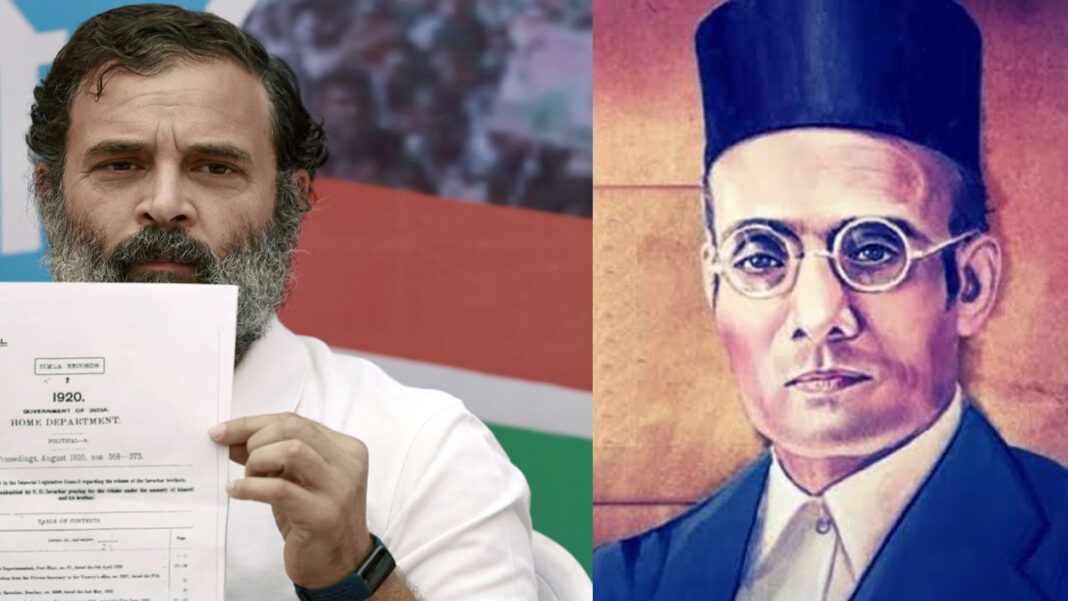INDIA: The issue of clemency petitions submitted by the veteran freedom fighter Barrister late Vinayak Damodar Savarkar (Veer Savarkaar) to the Britishers is being raked up time and again by the Congress to outwit the BJP, a Hindu protagonist party having links to the Rashtriya Swayamsevak Sangh (RSS).
Congress leader Rahul Gandhi continued his diatribe against Savarkar during his “Bharat Jodo Yatra” and also repeated anti-Savarkar remarks even after a Surat court pronounced him guilty and awarded him two years in prison for his Modi surname remark.
Savarkar did file clemency petitions. But he was the only freedom fighter who was awarded 50 years of rigorous imprisonment at a stretch in 1910 and ordered to be extradited to India for his connections with the revolutionary group India in London.
On the voyage back to India, he attempted to escape by jumping from the steamship SS Morea and sought asylum in France while the ship was docked in the port of Marseilles. However, the French port officials handed him back to the British government.
He was sentenced to life imprisonment totaling 50 years and was moved to the Cellular Jail in the Andaman and Nicobar Islands on July 4, 1911.
In jail, he was restrained in chains, flogged, and resigned to six months of solitary confinement. He was yoked into milking oil like a bullock. By some accounts, he was often forced to eat rotten food infested with worms and insects as punishment for his “crimes” against the government.
He served a 14-year jail term and was confined for 13 years to Ratnagiri district in Maharashtra, totaling 27 years. He was released in 1924 by British officials.
He stayed in Ratnagiri till 1937 and was released by the newly elected government of the Bombay Presidency. Later, he moved to Mumbai (then Bombay). He passed away on February 26, 1966, due to extreme ill health.
Following the assassination of Gandhi on January 30, 1948, police arrested the assassin Nathuram Godse and his conspirators. Savarkar was also named in the case but was acquitted.
The longest jail term
Which other freedom fighter in India sacrificed 27 years of life for the freedom movement? Who was awarded 50 years of rigorous imprisonment? The history shows that some other freedom fighters compromised with Britishers in some form or another.
Mahatma Gandhi served a prison term of 7 years in Indian jails and 5 months in African jails. However, he was stated to have been released most of the time based on compromise. Besides, his jail terms were of shorter duration.
Lokmanya Tilak served an 8-year prison term in Mandalay, Myanmar (Burma). He did not file a clemency petition.
Jawaharlal Nehru served a 9-year jail term. However, he was released from the Nabha jail (Punjab) only after he signed a bond that he would never enter the princely state again. This was nothing but clemency.
Difference of opinion
Although Bal Gangadhar Tilak (July 23, 1856–August 1, 1920), who raised the slogan “Swarajya is my birthright,” was the first leader of the Indian independence movement, after his demise, Mahatma Gandhi and Jawaharlal Nehru were at centre stage. Nehru was an anti-colonial nationalist and secular humanist.
whereas when the Muslim League was formed, Savarkar brought the Hindu Mahasabha and popularised the term “Hindutva” (Hinduness), previously coined by Chandranath Basu, to create a collective “Hindu” identity as an essence of Bharat (India). Savarkar was an atheist.
Congress’s indignation
Savarkar was against the Congress’ policy of the partition of the country, and Gandhi, Nehru, and Barrister Muhammad Ali Jinnah were in its favour.
Initially, Indians were apprehensive of Savarkar, but subsequently, they started realising his stand that partition was against the interests of Indians. But it was creating problems for the above triumvirate.
Savarkar succeeded in planting the seed that appeasement of Muslims was the conspiracy of Congress to use Muslims as an assured vote bank.
The Congress continued to be indignant about Savarkar. The Port Blair airport in Andaman was renamed as the Veer Savarkar International Airport in 2002 by the NDA government led by former Prime Minister late Atal Bihari Vajpayee.
However, in 2004, Congress leader Mani Shankar Aiyar got the plaque on Savarkar removed from the Cellular Jail premises. It was restored at the initiative of the then-Uttar Pradesh Governor Ram Naik (BJP) in 2015.
The “secular” Congress opposed to “Hindutva” will continue to do so going by its ideology, and Savarkar seems to be the target.
Also Read: Uddhav Thackeray Slams Rahul Gandhi over His Savarkar Remark



